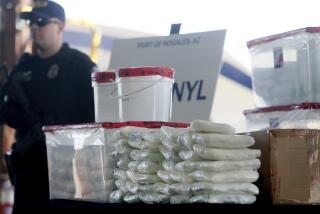Danger in the Home : Ignorance, Carelessness Set Up Poison Accidents
- Share via
NEW YORK — Antifreeze tastes sweet and lemon-freshened cleaners taste pleasantly sour.
It is a fact many adults are unaware of and many children try to find out, say poison control experts.
“It’s unusual for a child to ingest something that tastes really bad, like gasoline, but they do go for things that smell or taste nice,” said Anthony S. Manoguerra, president of the American Assn. of Poison Control Centers. “Most poisonings involving children involve ingestion of something they thought was food.”
But children are not the only ones to be poisoned in their own home, experts say. It is rare for an adult to accidentally ingest a poisonous substance, but it is not uncommon for them to spill, inhale or expose themselves to extremely toxic household chemicals.
Controlled in Workplace
“What most people don’t realize is that the very same chemicals they buy at the local hardware store to use in their homes are the same chemicals that are subject to a whole series of federal regulations when used in the workplace,” Manoguerra said.
“In the workplace, you need protective clothing, masks, ventilation,” he said. “At home they can be used without any of these cautionary measures.”
The poison centers estimate 7 million adults are exposed to toxic amounts of chemicals each year, both at home and at work.
Toxic does not mean fatal. Only about 350 adults and children die each year from accidental poisonings or chemical accidents.
But poison control experts said exposure to toxic chemicals and ingestion of poisons can cause permanent health damage and create serious medical costs.
Accidents Avoidable
“Every generation of new parents has to be reminded again and again,” Manoguerra said. “Every new homeowner has to be reminded too.”
Experts say most household chemical accidents could be avoided if people carefully read labels before using products that contain chemicals.
“There’s a tendency to go back and look at the label after something happens,” Manoguerra said.
“Most people are surprised that the chemicals they use in their homes can be dangerous.”
Poison control centers abound with stories of people who sprayed potent pesticides on themselves or on food or who mixed chemical products together without thinking about possible consequences.
Combinations Harmful
For years experts have been warning not to combine bleach and ammonia because it produces a toxic gas, but many people are still unaware of the consequences.
“They think if one cleaner is good, two are better,” Manoguerra said. “There are people who have died from mixing bleach with toilet bowl cleaner.”
Many people also fail to wear protective clothing when handling toxic pesticides or other chemicals and get the products up their noses, in their eyes and on their skin.
Poison control experts advise people who are exposed to toxic chemicals to rinse themselves off with soap and water and call a physician. If they get chemicals in their eyes, they should flush with warm water for 15 minutes and also call a physician.
Calls for Help Urged
Experts say people who have had an accident involving toxic chemicals should not hesitate to call a doctor or a poison control center, even if only for reassurance.
Manoguerra said many labels advise people what to do in case of accidents, but he said these are generally inconsistent and unreliable.
“Don’t go by the label. Call,” he said.
As for children, poison experts say many parents don’t realize how fast their small children are growing.
Children as young as six months can pull themselves up, grasp objects and place them in their mouths. Between 6 months and 2 years of age, children can manipulate latches and open containers.
More to Read
Sign up for Essential California
The most important California stories and recommendations in your inbox every morning.
You may occasionally receive promotional content from the Los Angeles Times.












